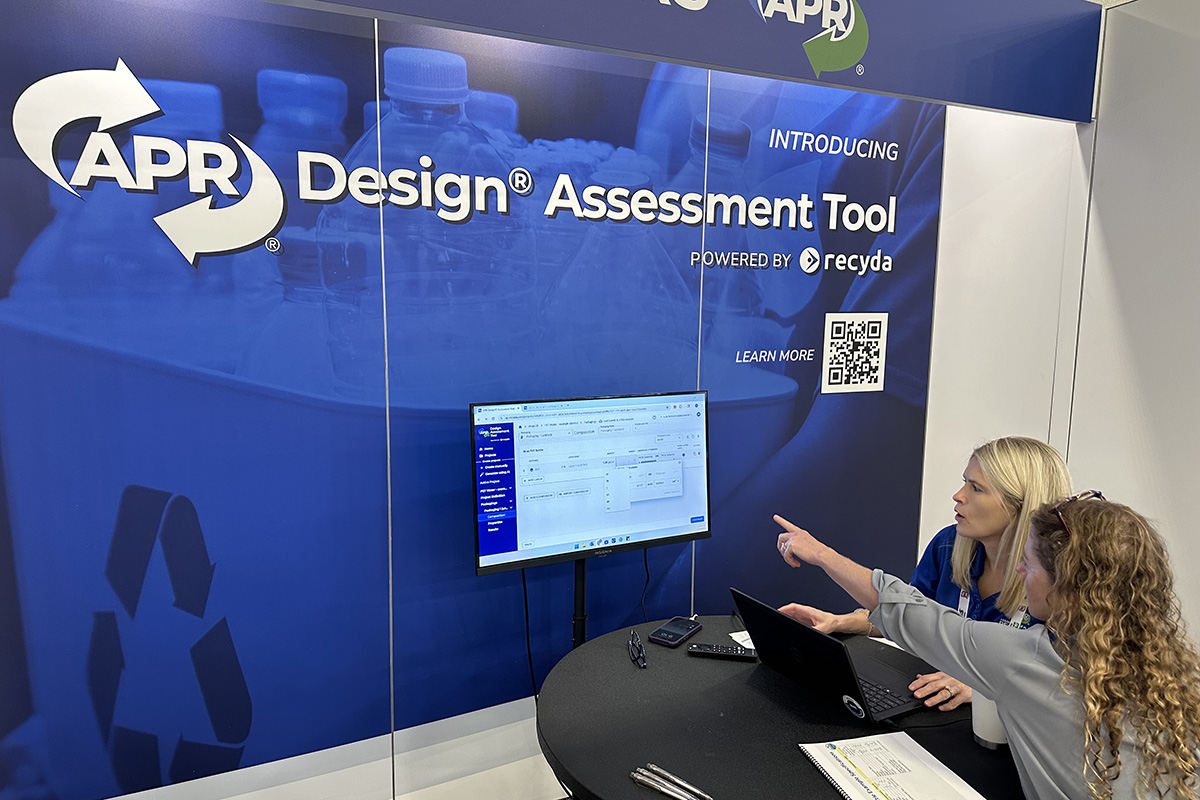
APR has unveiled a digital platform that evaluates whole plastic packages for recyclability and helps brands prepare for EPR and labeling rules. | Courtesy APR
The Association of Plastic Recyclers will launch a new digital platform to help brands and packaging suppliers evaluate the recyclability of entire plastic packages and prepare for policy requirements in the US and abroad.
Unveiled at Pack Expo 2025 in Las Vegas this week, the APR Design Assessment Tool powered by Recyda is the organization’s first in-house managed system that moves beyond component checklists to a full-package review tied to the APR Design Guide for Plastics Recyclability.
APR owns Resource Recycling, Inc., publisher of Plastics Recycling Update.
“For more than three decades, the APR Design Guide has been the gold standard for recyclable plastic packaging design,” said Steve Alexander, APR president and CEO, in a statement. “This new tool takes that legacy to a new level — giving companies a one-stop solution to improve recyclability and compliance while saving time and money.”
Set to launch in the first quarter of 2026, the platform will provide real-time assessments, flag missing data and benchmark designs against the Design Guide so users can reduce errors, reduce compliance risk and simplify reporting. APR frames the effort as a way to centralize packaging specifications while keeping them current as official guidance changes. It will also be demonstrated at APR’s fall member meeting in Salt Lake City, Oct. 21-23.
The tool is built with software from Recyda, a Germany-based provider focused on packaging sustainability and international compliance. APR says the collaboration couples a live APR ruleset with features for data intake and reporting that can scale from individual projects to large portfolios. The platform emphasizes third-party verification by APR in place of self-appraisal, and it is positioned to help companies coordinate design decisions with recyclability criteria recognized by reclaimers.
In a press statement, APR outlined three subscription tiers, reflecting team size and design requirements. The Starter level targets individual developers and offers unlimited single-package assessments with alerts for missing information and guidance on design fixes, as well as tie-ins to APR’s Preferred Design Recognition program for validated components. The middle Core tier is aimed at teams managing up to 100 SKUs and adds bulk uploads via format-specific templates.
The Advanced tier integrates with enterprise systems such as PLM or ERP via API, evaluates non-plastic packaging across more than 20 countries, forecasts extended producer responsibility (EPR) fees and savings from design changes, and includes dashboards and exportable reports. The design recognition program also has seen recent updates, which can support verification workflows alongside assessments.
The announcement arrives as packaging EPR and recyclability labeling rules advance in multiple jurisdictions. California continues to refine SB 54 implementation, including recent rulemaking action and producer registration, while Oregon’s program crossed a major milestone when dollars began flowing to communities on July 1. As it moves toward a 2026 rollout, Colorado’s producer responsibility organization (PRO) has updated its proposed plan and Maine has finalized rules for its packaging EPR law. Label-claim rules are also tightening, with California’s SB 343 shaping recyclable labeling.

